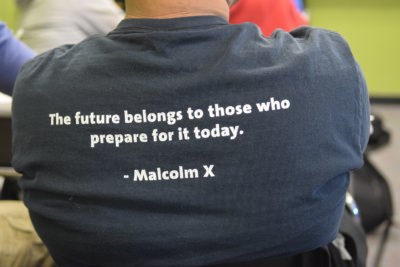

With eight more weeks for North Carolina voters to consider whether to elect Pat McCrory or Roy Cooper as the state’s chief executive for the next four years, a potent question arises anew: “What does it take to serve as an ‘education governor’ in the 21st Century?”
The question was posed in a report published a decade ago by The Wallace Foundation and the James B. Hunt Jr. Institute for Educational Leadership and Policy. For the report, the Hunt Institute assembled academic research on leadership and spotlighted examples of gubernatorial education initiatives by both Democrats and Republicans.
I cite the report with confidence, but also a bit of sheepishness, because I wrote it. Citing it here flouts what I learned in journalism school: don’t quote yourself. Still, it holds up well as a current guide to evaluating candidates’ capacity to exercise gubernatorial leadership.
The report — titled simply, “Education Governors for the 21st Century” — does not advocate a specific agenda but recognizes that different governors from different political parties would pursue their own agendas for their different states. The report identifies four overarching characteristics that combine to forge effective gubernatorial leadership in education:
- Education governors educate themselves by drawing on current research and learning best practices. And their education should take place within the campaign itself, as candidates draft platforms and interact with constituents and visit schools. “The political campaign ought to be part of the diversity in learning experiences for would-be political leaders,” said former Florida Gov. Bob Graham, a Democrat.
- Even a strong governor can’t do everything at once. It’s crucial to set priorities, concentrating on key issues and putting others aside. A governor should use data in formulating a cohesive agenda. Former Tennessee Gov. Lamar Alexander, now a Republican U.S. Senator, pointed out the power in giving priorities a brand name – one of his examples: “Basic Skills First, Computer Skills Next.”
- Education governors should use the “bully pulpit” and exercise their political skills in building coalitions in support of their policies. “Just through the sheer force of leadership,” said former South Carolina Gov. Dick Riley, a Democrat, “governors can force the attention of people on an issue, explain what it is and then move the state toward an equitable solution.”
- It takes consultation with the multiple “stakeholders’’ to design and implement an education agenda. “A governor,” says the report, “must get business people invested, working with education administrators and teachers and, above all, getting a clear mandate from the people.”
To be sure, these four characteristics do not fit easily into 30-second TV commercials. Voters have to evaluate the candidates beyond figuring out who’s right, or nearly right, in the back-and-forth over teacher pay.
As a Republican who became governor two years after his party formed a legislative majority, McCrory often responded to legislators’ initiatives and struggled to elevate his own agenda. Would a second term be different, and how? As the Democratic challenger, Cooper has argued that he would work to stymie what he sees as a decline in support for public education under Republican rule. How would he go about reasserting the primacy of public education amid the recent proliferation of school-choice options?
It’s not too much to ask of the candidates that they deliver an extended speech, or even hold a press conference, on education to give voters a greater sense of their agendas and their styles of leadership. And it’s not too much to ask the moderator of the impending Cooper-McCrory debate — Chuck Todd of NBC News — to understand that North Carolina as a state is engaged in a great civic clash of ideas and to formulate questions that draw out the candidates on their willingness and ability to serve as the next education governor.


